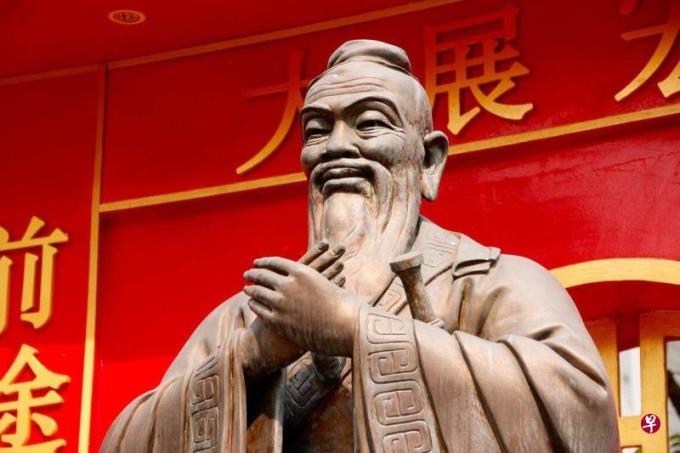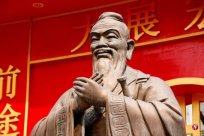
Herbert Fingarette is a professor of philosophy at the St. Barbara Campus of the University of California. He was born in 1921 and died at the age of 97 in 2018.Although his husband is professional in Western philosophy, he published a book discussed by Confucius in 1972: Confucius: The Security as Sacred (Harper Torchbooks), but in the Western academic circles (non -Han Dynasty, only HanThe academic circles caused an extraordinary response.Last year, this book was published in the 50th anniversary.
The text of the book is only pages of pages of 79, but British Sinologist Ge Ruihan (A. C. Graham, from 1919 to 1991) said it "updated all our ideas for Confucius and opened how to re -understand this saint and Xiangxiang again.The perspective of his learning ".Herrlee G. Creel, a Sinologist at the University of Chicago (1905 to 1994), praised that he couldn't remember the 50 years when he studied Confucius.A book can give people greater inspiration.Michael Nylan, a professor at the History Department of the University of California, Berkeley Campus, even said that Confucius was "changed to many people's lives."Her colleague Hans Sluga, as a colleague of European philosophy experts, pointed out that Professor Finage was a scholar who often picked up a topic that many philosophers had passed.He rarely paid attention to the character of Confucius in the Western philosophy community, and when he only paid great attention to Chinese philosophy, it was unforgettable to write this book.
Professor Finage, Professor Finage, was translated from Jiangsu People's Publishing House in 2002 to Confucius in 2002: that is, all the sacred publishing, re -printed and re -printed in 2016 and 2020, the translator is Peng Guoxiang and Zhangmagnificent.
Professor Finage in the preface of this book said that when he started reading Confucius, he felt that he was a tedious and narrow thought.For him, the Analects seems to be just a quotable quotation that is old and disconnected from the times.
But later, after understanding the greater efforts, he realized that Confucius was a profound insight, and in the ambitious imagination of people, it was enough to compare with the other wise men he knew.Essence
Professor Finage was convinced that Confucius could become "our teacher today: an extremely important thing, not just to add a little exotic perspective to what we already know. He tells us some of them.I have never said something that must be said. He has new things to teach us. "
"We" here refers to the United States or the entire Western world.In the end, what kind of "new" and teachings that can be given to "new" and suitable for "today" can be given to "today" more than 2000 years ago?
"Li" is the focus of the Analects of philosophy
Professor Luo Siwen (Henry Rosemont Jr. (1934 to 2017), who is well -known in the field of Confucius research in the American academic community, was a comment as early as 1976: that is, a comment was written by all sages.His interpretation of Professor Finage can help us understand why this book is so enlightening to Westerners.
In the Analects, the word "Li" appeared 75 times, and "benevolent" appeared 109 times.Scholars have always believed that Confucius has given more attention to "benevolence", but Professor Finage believes that "ritual" is the focus of the philosophical philosophy.Moreover, "Ren" only shows its righteousness when referring to "Li".In short, for Confucius, "ritual" is not a festival that is in vain and empty meaning, but it really contains profound connotations.With.Professor Luo Siwen's interpretation of the latter, that is, the point of "how etiquette shaped the cohesion of the community", allows us to directly understand. Why Professor Finage said why Confucius "has new things to teach us".
Professor Luo Siwen pointed out that in the understanding of Professor Finage, for Confucius, it is too important to make the society's effective norm, so it cannot be done by the government.The best way is to make the tradition (that is, "ritual") the power to condense people's unity.This claim of Confucius made a political extension to narrow the government's roles and limit his responsibilities to affairs that cannot be handled by families, clans, and communities.Even in the local area, local affairs should be a little less interfered by law and officials, and more are restricted by customs and traditions.
Professor Luo Siwen even believes that if this thinking is stringed from the entire argument, the book can be said to be full of no governmentist taste.Because most of the anarchist believes that in fact, people can get along well without being ordered and coercive; or consciously determine that they must do this (that is, as the "social contract saying").
Professor Elotwen's opinion, Professor Finage's outstanding consciousness let us see that Confucius's views on tradition may be enough to eliminate a general criticism of him -he isA reactionary authoritarian and authoritarian maintenance.Because Confucius actually attached importance to ancient traditions and opposed a regular political system.
Professor Luo Siwen pointed out that the importance of Professor Finage is through Confucius thoughts that people have realized that tradition is still meaningful.For the current West, it is like a head drink.Because it is not difficult to find out at the moment, no matter how different people's political identity is, an increasingly obvious situation is that people have paved the way for the past to pave the way for the future and pay a high psychological cost.Our ancestors and us did not vote to choose to abandon tradition, or transform tradition in a form of losing enthusiasm.
Eliminates the high psychological price of the past
But despite being ruthlessly attacked, many customs (Customs), or large or small etiquette (Rituals) and Ceremonies still have all cultures, including Western culture.Therefore, Professor Luo Siwen intends to explain that Professor Finage in Confucius: that is, all the sacred warnings: If traditional, customs and ceremonies are not cherished and strengthened, many of the things we have will be indispensableReturn to lose.
Of course, Professor Luo Siwen also realized that a general view that is also common in society is that "traditional oppression" is suffocating, so thorough change is only through major and persistent (and often blood).Efforts are completed.As a result, any traditional chanting may make people feel that this will hinder the redistribution of power and resources within each cultural system and between each other.In addition, there are some negative traditions, such as racial discrimination, which is not worth retaining.
But Professor Luo Siwen pointed out that if you only focus on these negative traditions, it is tantamount to seeing trees and no forest.He believes that Professor Finage's interpretation of Confucius can still stand hard.Because, what we often see is that, in fact, compared to customs, etiquette and ceremonies, more people need to bear the tools from political and economic forces -officials, military, large enterprises -greater oppression.
Professor Luo Siwen drew the finishing touch: the teaching that Confucius (Finage) gave us neither a specific culture nor losing time.That is, letting a society work seriously and harmoniously may be an important thing that cannot be delivered to the government. Tradition may be a feasible choice.
Since the process of completing the second industrial revolution in the middle of the 18th century to the beginning of the 20th century, the "Modernity" of Europe and the United States (may also include Japan) has long been leafy.Therefore, before and after the middle of the last century, the Western intellectual community has spared no effort to open the cultural reflection of "Post-Modernist", and think about whether their society has been destructive in the past two hundred years of rapid development.Already walked over.This is the birth of how Professor Finage can read Confucius from reading Confucius, and he has the general trend of ancient and modern thoughts.
However, in the Asian countries on the other side of the ocean, until the middle and late 20th century, many of them are still "developing countries".In the historical process.Therefore, even in the original Township of Confucianism at that time, the western Zhou Dynasty's etiquette and music civilization was the market as a "ritual and religion".
Some "progressive" historians can still grasp Confucius to answer the words of Yan Yuan's "self -denial and reconstruction", and give him a romantic reactionary landlord class spokesperson for the decay feudal slavery.It can be seen that the one of the other is the warning of "if the tradition, customs and ceremonies are not cherished and strengthened, many of our things will be irreversible", it is a long time.
It can be seen that thinking about thinking resources from the ancient cultural heritage, and in response to the needs of the times, "seeking benevolence and benefits", it is nothing, ancient and modern, Chinese and foreign.The refractives have different development and the differences in society.


